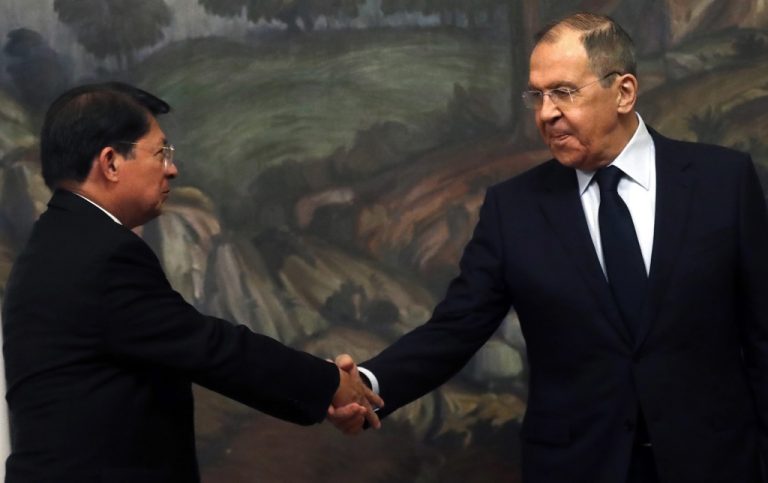4 de abril 2023

“NicaraguAmor” Cultural Caravan for Nicaraguans in the USA

PUBLICIDAD 1M
PUBLICIDAD 4D
PUBLICIDAD 5D
Costa Rican Deputy Foreign Minister Christian Guillemet said that his government “does not see the conditions” to formalize the inclusion of the Russia

After a press conference in Moscow, Nicaraguan Foreign Minister Denis Moncada Colindres (left) greets his Russian counterpart, Sergey Lavrov. Photo: EFE
The intention of Daniel Ortega's regime to include Russia as an “observer country” in the Central American Integration System (SICA) will possibly be met with the refusal of the Costa Rican government, according to Costa Rican Deputy Foreign Minister Christian Guillermet, who assured that he “does not see the conditions” to make the incorporation official.
In declarations to the Costa Rican newspaper La Nación, the diplomat stressed that Russia's invasion of Ukraine would motivate several SICA countries - where resolutions are decided by consensus - to oppose this incorporation. “It is a clear violation by Russia of the UN Charter, of the (democratic) principles that are in the Charter, but also of the same Tegucigalpa protocol that establishes that member countries promote peace and respect for human rights,” he justified.
Guillermet said that if he attends a meeting where an attempt is made to address that issue, he will oppose its introduction on the agenda. “There are no conditions,” he insisted while recalling that Costa Rican President Rodrigo Chaves has condemned Russia's aggression against Ukraine.
The statements arise because last Thursday, Russian Foreign Minister Sergey Lavrov said “We have good relations with SICA, which will soon grant Russia observer status. The corresponding agreement is already prepared.”
Lavrov's announcement was made at a press conference with his Nicaraguan counterpart, Denis Moncada Colindres, who headed a delegation of Nicaraguan officials – including the son of presidential couple Laureano Ortega Murillo – who visited Moscow to discuss the progress of bilateral cooperation between the two nations.
According to La Nación, Guillermet pointed out that such an agreement does not exist and what Lavrov and Moncada are trying to do is to create confusion, while the Ortega regime continues the persecution of opponents in Nicaragua.
“Moncada is pretending that he has influence over SICA, that he is going there (Moscow) on behalf of SICA, but Moncada has no possibility of doing that”, remarked the vice minister.
He revealed that weeks ago, in a preparatory meeting, the Secretary General of SICA, Werner Vargas, raised the pending discussion of Russia's entry, but countries such as Guatemala and Costa Rica objected to its inclusion.
Nicaraguan lawyer Werner Vargas took office in August 2022, after an impasse of more than a year without a secretary general, due to repeated attempts by the Ortega dictatorship to appoint political figureheads without diplomatic experience to the post.
In declarations to CONFIDENCIAL, Costa Rican international affairs analyst, Carlos Murillo Zamora, commented that the incorporation of Russia was “a decision of the Secretary-General (Werner Vargas), who will hardly do anything that does not have the endorsement of Ortega”.
SICA is formed by Guatemala, El Salvador, Honduras, Nicaragua, Costa Rica, Panama, Belize and Dominican Republic. It also has 40 observer states and organizations, including Taiwan, Spain, the Vatican State, Argentina, Brazil, Chile, Colombia, the United States, Ecuador, Mexico, Peru, and Uruguay.
According to La Nación, in December 2018, without Costa Rica's opposition, SICA foreign ministers admitted Russia, Canada, Bolivia, Sweden, Egypt, Georgia, and the International Youth Agency as observers.
To make the inclusion official, the General Secretariat of the regional organization, with the endorsement of the Council of Ministers of Foreign Affairs, must sign a document with each country in which the lines of cooperation or political dialogue to be developed are agreed upon. In the case of Russia, “this agreement has not been signed and the issue is not even on the agenda for discussion”, Guillermet explained to La Nación.
He pointed out that Russia had tried to join SICA in 2015, but Costa Rica's then-foreign minister, Manuel González Sanz, objected to the process in reciprocity with Nicaragua, which vetoed the incorporation of Israel, which eventually became an observer.
Observer countries can participate in meetings, especially those related to integration, cooperation, and development in areas such as technology, trade, and the environment, among many others.
Carlos Cascante Segura, professor at the School of International Relations of the National University (UNA) of Costa Rica, told CONFIDENCIAL that most observer countries “contribute funds” to SICA, and “their influence is given by the amount of cooperation they can give”.
However, in the case of Russia, which is currently facing the economic costs of the invasion of Ukraine and the sanctions of the international community, “it is not a feasible major cooperant in the region”, the professor pointed out.
In the same vein, the Costa Rican deputy foreign minister commented that, in 2018, when SICA admitted several countries, including Russia, the Costa Rican government saw the possibility of receiving cooperation in scholarships and fertilizers. “Now Russia has nothing to contribute,” he assured.
This article was originally published in Spanish in Confidencial and translated by our staff.
PUBLICIDAD 3M
Confidencial es un diario digital nicaragüense, de formato multimedia, fundado por Carlos F. Chamorro en junio de 1996. Inició como un semanario impreso y hoy es un medio de referencia regional con información, análisis, entrevistas, perfiles, reportajes e investigaciones sobre Nicaragua, informando desde el exilio por la persecución política de la dictadura de Daniel Ortega y Rosario Murillo.
PUBLICIDAD 3D